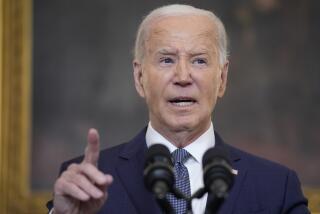Bargaining in the Middle East
- Share via
Two weeks after the event Jordan has moved to set the record straight on what King Hussein and Yasser Arafat, chairman of the Palestine Liberation Organization, agreed to in the “bid for joint action” that they signed on Feb. 11. The accord turns out to be something less than the dramatic breakthrough toward Middle East peace that inspired rumors in some Arab capitals had suggested. Indeed, that Jordan chose no higher a functionary than its acting information minister to make the agreement public suggests the low level of significance that Hussein himself attaches to it.
On two key points the Hussein-Arafat proposal fails by its silence to meet the basic test of practicality. It says nothing about U.N. Security Council Resolution 242, which in essence calls on Israel to yield at least some of the territory that it occupied in the 1967 war in exchange for Arab recognition of Israeli sovereignty and borders. And it says nothing about direct negotiations between Jordan, or between a joint Jordanian-Palestinian delegation, and Israel. Instead, it falls back on the impractical notion that there should be a vast international conference participated in by the five permanent members of the Security Council and “all parties to the conflict”--a formula that could be taken to embrace Syria, Libya, Iraq and every other irreconcilable in the Middle East.
To be sure, Jordan’s acting information minister contends that the agreement’s overall reference to “U.N. (General Assembly) and Security Council resolutions” does, at least implicitly, signal PLO acceptance of Resolution 242--something that both Israel and the United States insist on as a prelude to any talks. The trouble is that this encouraging interpretation was denied four days before it was even made by the PLO’s executive committee in Tunis, after it was briefed by Arafat about his talks in Jordan. Hussein has always said that he won’t negotiate with Israel over the West Bank without the PLO’s prior approval. If the PLO says that the Hussein-Arafat agreement does not amount to PLO acceptance of Resolution 242, then it doesn’t, and that leaves the agreement pretty much what the diplomats call a non-starter.
There are, however, some in the Middle East able to look at things more realistically. President Hosni Mubarak of Egypt is one. In recent days he has sent several emissaries to talk to the Israeli leadership, thawing out the cold peace relationship that has prevailed since Israel’s invasion of Lebanon 32 months ago. Now Mubarak has gone public with a specific proposal. He would like President Reagan to invite Israel and a Jordanian-Palestinian delegation to hold direct talks on a settlement. Alternatively, he says that he is ready to host such direct talks himself, in Cairo.
Israel’s Prime Minister Shimon Peres, who a few days ago publicly offered to go to Amman or anyplace else to negotiate with Hussein, has expressed interest in the Mubarak proposal. But Israeli interest means nothing in the absence of a negotiating partner. Many West Bank Palestinian leaders are eager to join Hussein in negotiations with Israel, fearing that unless talks come soon the whole of the West Bank will pass irrecoverably under Israeli dominion. It is not, however, the endorsement of the West Bankers that Hussein seeks before he agrees to any talks on the area’s future, but the approval of the PLO. That has yet to be given, at least in any form that could really serve to make negotiations possible.
More to Read
Sign up for Essential California
The most important California stories and recommendations in your inbox every morning.
You may occasionally receive promotional content from the Los Angeles Times.










